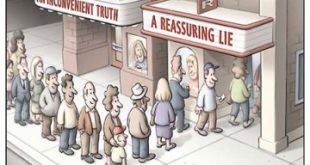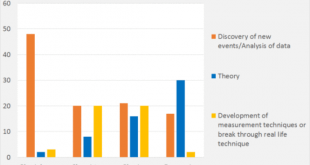Taylor series (student stuff) [embedded content] Advertisements
Read More »Mainstream economics — an emperor turned out to be naked
Mainstream economics — an emperor turned out to be naked The main reason why the teaching of microeconomics (or of “ micro foundations” of macroeconomics) has been called “autistic” is because it is increasingly impossible to discuss real-world economic questions with microeconomists – and with almost all neoclassical theorists. They are trapped in their system, and don’t in fact care about the outside world any more. If you consult any microeconomic...
Read More »How to live your life (personal)
How to live your life (personal) [embedded content] Among documentaries this is my absolute favourite. Whenever my soul gets tired, watching this wonderful video of simple — good — life gives me new energy and hope. Advertisements
Read More »You’re done Tommy boy!
You’re done Tommy boy! [embedded content] I really love this guy. With razor-sharp logic he immediately goes for the essentials. He has no time for bullshit. And neither should we! Advertisements
Read More »Formal mathematical modeling in economics — a dead-end
Formal mathematical modeling in economics — a dead-end Using formal mathematical modeling, mainstream economists sure can guarantee that the conclusions hold given the assumptions. However, the validity we get in abstract model worlds does not warrantly transfer to real world economies. Validity may be good, but it isn’t enough. From a realist perspective both relevance and soundness are sine qua non. In their search for validity, rigour and precision,...
Read More »Structural econometrics
In a blog post the other day, Noah Smith returned again to the discussion about the ’empirical revolution’ in economics and how to — if it really does exist — evaluate it. Counter those who think quasi-experiments and RCTs are the true solutions to finding causal parameters, Noah argues that without structural models empirical results are only locally valid. And you don’t really know how local “local” is. If you find that raising the minimum wage from $10 to $12 doesn’t reduce...
Read More »Truth and economics (II)
Truth and economics (II) Reading some of the comments on my earlier post on the status of truth in ‘modern’ economics, yours truly came to think of Robert Solow’s assessment of ludicrously ‘post-real’ model assumptions … Suppose someone sits down where you are sitting right now and announces to me that he is Napoleon Bonaparte. The last thing I want to do with him is to get involved in a technical discussion of cavalry tactics at the battle of Austerlitz....
Read More »So much for the ’empirical’ revolution in economics
So much for the ’empirical’ revolution in economics Sometimes a picture is worth a thousand words … Source: Merijn Knibbe Advertisements
Read More »Thought of kissing my wife in public today, but I got second thoughts …
Thought of kissing my wife in public today, but I got second thoughts … [embedded content] Advertisements
Read More »Blah blah blah economics
Blah blah blah economics A key part of the solution to the identification problem that Lucas and Sargent (1979) seemed to offer was that mathematical deduction could pin down some parameters in a simultaneous system. But solving the identification problem means feeding facts with truth values that can be assessed, yet math cannot establish the truth value of a fact. Never has. Never will. In practice, what math does is let macroeconomists locate the FWUTVs...
Read More » Lars P. Syll
Lars P. Syll






